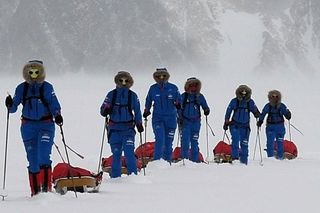
Study Finds Women As Fit As Men for Extreme Physical Exertion
Can we finally put to bed the phrase ‘the weaker sex’?

New research may finally lay to rest the trope of the ‘weaker sex.’
“Our findings contain some potentially myth-busting data on the impact of extreme physical activity on women,” says Dr Robert Gifford, of the University of Edinburgh’s Centre for Cardiovascular Science and the Royal Centre for Defence. “We have shown that, with appropriate training and preparation, many of the previously reported negative health effects can be avoided.”
Gifford was part of a team monitoring the health of the six members of Antarctica Ice Maiden, the world’s first all-female expedition to ski 1,700km across the heart of the frozen continent.
Among the women of the expedition, which recently concluded, he and his colleagues found no more negative effects from the extreme exertion than could be expected in men. They say this suggests that women, given appropriate training and preparation, can be just as physically resilient as men.
This finding may feel obvious, in 2018. It’s been 51 years since race officials tried to prevent Kathrine Switzer from running the Boston Marathon by physically tackling her, out of a belief that women were unfit for physical exertion. (Switzer’s boyfriend at the time warded them off, and she went on to become the first woman to officially run and complete a marathon.)
But reports, and hence beliefs, that extreme physical activity lowers women’s levels of reproductive hormones, heightens their levels of stress hormones, and diminishes their bone strength, have persisted over the decades. Gifford and team, however, found the transantarctic team’s markers of reproductive function and bone strength were maintained throughout the expedition. And that other markers across stress, weight, and/or skeletal, reproductive and metabolic health, suggested, weeks after the expedition wrapped up, that the women had benefited from their exercise.
“These findings could have important relevance for men and women in arduous or stressful employment, where there is concern that they are damaging their health. If an appropriate training and nutritional regime is followed, their health may be protected,” Gifford says.
Appropriate training and nutrition are, perhaps, the key words here. To date, most training and nutrition advice has been based on study and understanding of men’s physiology, and doesn’t always yield the same benefits for women.
While these findings will need to be replicated beyond merely six women to have wide bearing on female physiology at large, they offer hope that there will be more opportunities for women to engage in extreme physical exertion, validate and add to these findings.
Liesl Goecker is The Swaddle's managing editor.
Related


Fearing Pain Actually Makes You Feel More Pain
